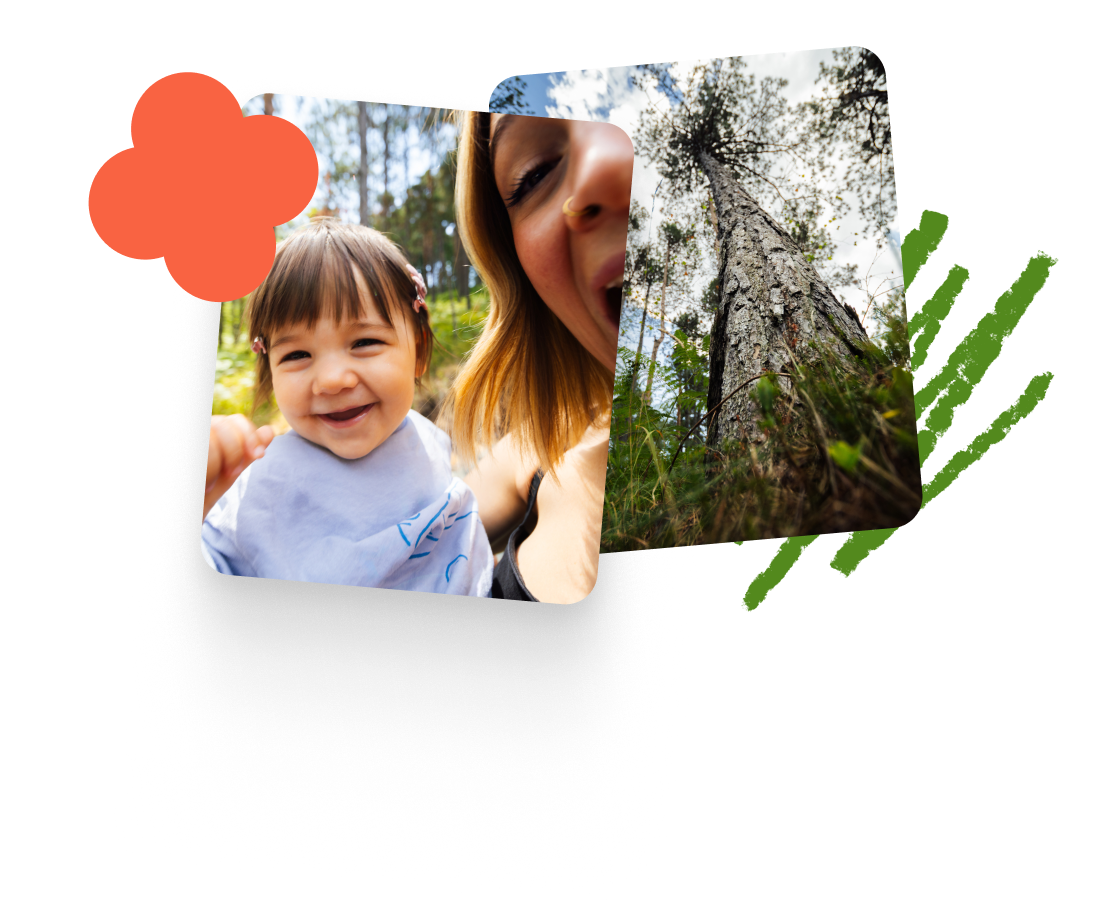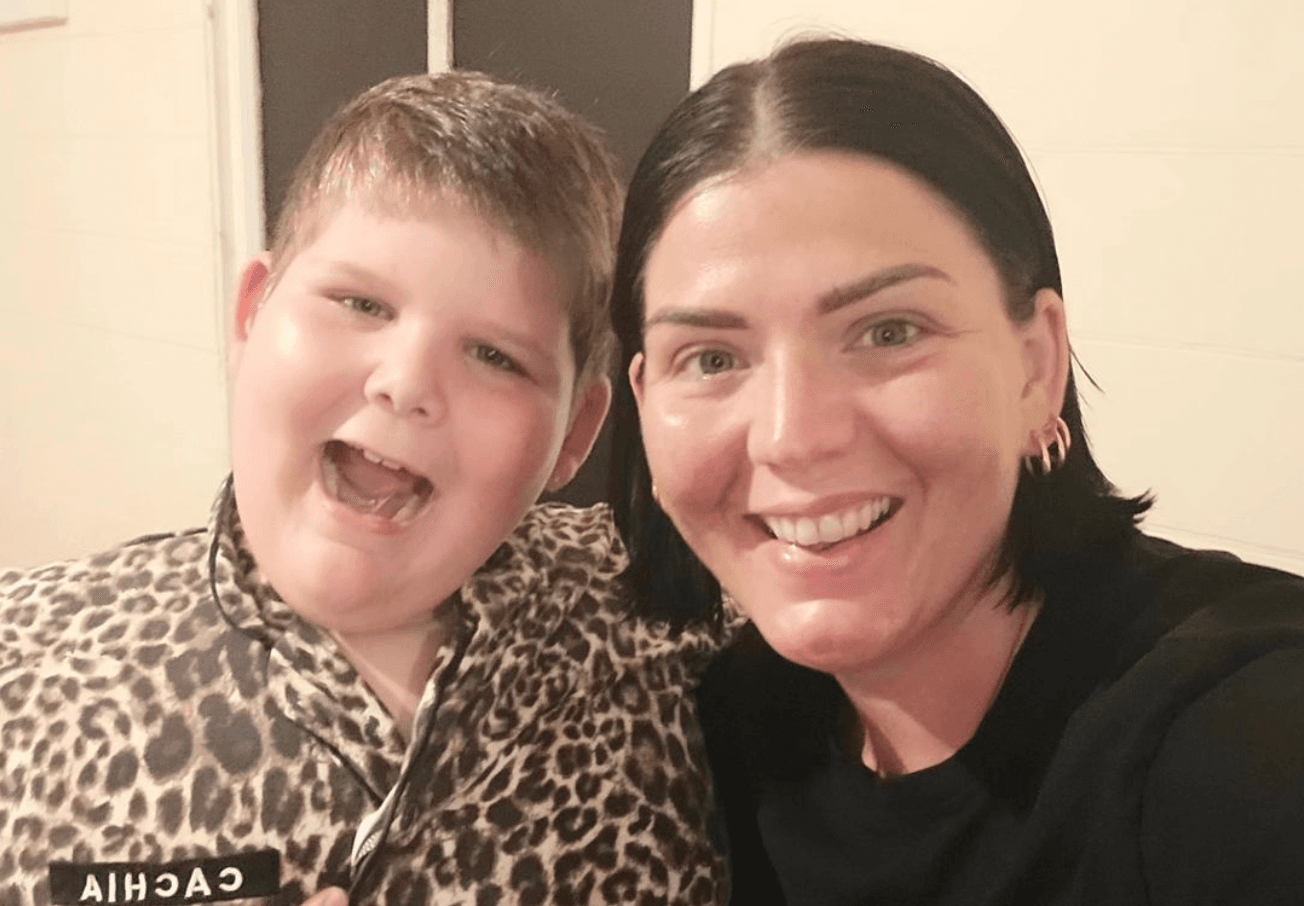
is now part of
Joy Parenting Club!
Families and care organisations using Heba will now have the option to also join Joy. For any questions, reach out to us at hello@heba.care

Families and care organisations using Heba will now have the option to also join Joy. For any questions, reach out to us at hello@heba.care

September 17, 2024
This Aussie mum of two traded self-judgement for self-kindness – and she's supporting other caregivers to do the same.
Courtney Welsh lives with her husband of and their two sons, Dennison, 12, and nine-year-old Fletcher in Townsville, North Queensland. She works full-time as a senior administrator, parents both of her boys and cares for Fletcher, who is autistic and has several diagnoses including ADHD, generalised anxiety disorder and sensory processing disorder.
Currently reading her way through Freida McFadden’s bestselling psychological thrillers, Courtney always has a crime or self-development podcast on the go. And while she doesn’t watch much TV, she never misses an episode of Home and Away (“Please don’t judge me!”).
A few years ago, Courtney started sharing some of her experiences and thoughts around caregiving on her Instagram account. Her hope was to create a space of education, community and awareness for disability families. As she says – “I want to allow people into the parts they don’t get to see – so other parents and carers feel safe enough to say, ‘me too’.”
Here, Courtney shares some of her story and advice for fellow caregivers.

When we are expecting a child, we usually expect to be their parent, not their ‘carer’. Do you identify as Fletcher’s carer?
I have often thought about this – and I do identify as a parent, carer. I think for me, I started to identify myself this way in the last two-to-three years. I look at it this way: you will be someone’s parent for their whole life, but that role changes and becomes more about guidance and love. Whereas with my son, I will always be caring for him, as well as parenting him.
He will always require assistance with hygiene, social interactions, toileting and things that we, as parents, typically stop doing after a certain time in our children’s lives.
What did you find most challenging in the early stages of navigating Fletcher’s autism diagnosis? And what helped you during this time?
Honestly, fear of the future. When we started the diagnostic process I knew deep in my heart where it was headed, but hearing the words still took my breath away. Of course I was relieved and excited that he would have access to the right supports, but my mind went straight to his future and I really did spiral with a lot of negative thoughts.
What helped me the most was time, research, and being kind to myself. I read a lot and I felt as though having a lot of knowledge helped me feel less anxious.
How did you start forming connections with other parents raising autistic kids, and what changed for you once you started forming these connections?
A lot of my connections were online. I joined a Facebook group, and it was AWFUL. It was so judgmental and it really scared me off joining groups for a long time. As time went on, I started to find communities online that were kind and welcoming – and that helped a lot. I think what changed is the feeling of not being alone.
Why did you decide to start creating social media content and sharing some of your experiences – and what impact has this had on your life?
My passion and pull has always been toward carer support. I’ve learned since sharing my own journey that there are parents struggling in silence, purely out of fear of judgement. My goal was always to educate, advocate, make people smile, and feel less alone in their own journey.
I am not afraid to talk about the hard parts whilst creating a community that also celebrates EVERY single win, no matter how small.
Creating content for social media has impacted my life so much. It has given me a purpose, as well as having a safe place for me to be able to share my own journey.
Nowadays, what do you find most challenging about being a parent carer? And on the flipside, what brings you the most joy?
The thing that I find the most challenging is the constant mental load. Parenting is hard enough, but the mental load for disability parenting is relentless. I am always looking for danger and triggers while finding pockets of time to try and embrace the beauty. The balance is not always balanced.
I also really struggle with not being able to comfort Fletcher in the traditional way. When he hurts, as a mother, my instinct is to cuddle and be close to him, but he is not affectionate at all.
He finds emotions quite triggering, so learning how to comfort him in his own way has been a challenge.
My joy comes from seeing Fletcher smile every single day – the moments of regulation when his face softens and he looks genuinely happy and calm. It brings tears to my eyes every single time. Even now, nine years into our journey.
Everything I do, I do it for him and his brother.

Tell us about Fletcher’s relationship with Dennison. What do they tend to do together?
Genuinely, given their circumstances, it is wonderful. Is it perfect, or easy? NO! It takes a lot of patience and flexibility from Dennison, which can be hard to navigate, but they are so close.
My husband and I need to be involved and close during their play time to ensure we can help if needed, but they teach each other things every day. Watching them find their own way of bonding is so special.
They tend to do a lot of board games, electronic gaming, and they play sports together a lot, until Fletcher loses and it’s game over, quickly!
Many parent carers need to step out of their careers to meet their child’s needs. How has your working life changed, if at all, since becoming a parent – and how do you feel about these changes
Gosh, this is hard. I work full-time and help with an incredible caregiver community called Kindship, as well. So technically I have two jobs outside of the home.
I’m very lucky that I’m an organised person by nature and can keep on top of most things. I also have an incredibly supportive and hands-on husband. I’ve recently had to reduce my hours to school hours because Fletcher’s care needs have increased, beyond what his grandparents have the physical capacity for.
What supports have you put around yourself – or do you hope to put around yourself, as a carer?
I exercise. I wake at 4.45am every morning, go for a walk and then to the gym – which is in my home – just to stay calm for the chaos that is our life! At times I carry a lot of guilt around making that time for myself, but it is so very important.
Again, I have my husband and my parents who are always willing to help or listen. And to be honest, having a judgement-free place to just vent makes all the difference.

What do you wish other people knew about life as a parent carer?
I wish people knew that it’s okay if they don’t understand, we don’t expect you too. We do, however, need patience and flexibility.
Invite us, even if you know we will say no. Listen to us, even if you can’t relate to what we are saying. Love us, even when we cancel on everything last minute.
I’m very lucky with the small circle we have around us, but I really believe it all comes down to kindness, empathy and understanding.
What advice do you have for parents who are new to caring for an autistic child?
Take a breath! This isn’t your fault. It won’t always feel this heavy. You’re doing the best you can, and that is ALWAYS enough.
The opinions of others don’t matter, ignore the noise and be kind to yourself.
You’re not drowning, you’re learning to swim through a journey you never expected to navigate.
Looking to the future, what are your hopes and dreams around how your son is cared for and your role in his care?
I just want him to feel safe and supported enough to be himself. I want him to have access to supports that allow him to live a life that he loves. I want to teach him independence so that he can thrive with me alongside him, but in a life where he is forging his own path.
What books/podcasts/TV shows/films/resources have you found relatable, inspiring and/or helpful as a parent carer?
I researched a lot about Autism and Fletcher’s other diagnoses, but a lot of the podcasts and content I consumed was about self-development and how I could look after myself better, so I could be the parent and carer that he needed me to be.
I am part of the Kindship Community Facebook page, which has helped a lot, and I also loved the podcast On the Hard Days. Listening to other people’s stories really helped me feel less alone.
Is there anything else you’d like to add?
Being a parent and carer is HARD. You’re allowed to be grateful and tired. You’re allowed to love your child with every inch of your being and still feel overwhelmed and wish things were not this hard. Feelings are allowed to co-exist. It doesn’t have to always be wonderful for your life to still be filled with love and beauty.
Be kind to yourself x
Follow Courtney’s story on her Instagram account.
Let’s clear out the complexities of care. Try Heba for free.
Want to share your parent-carer story? We’d love to hear it. Get in touch with our team at hello@heba.care